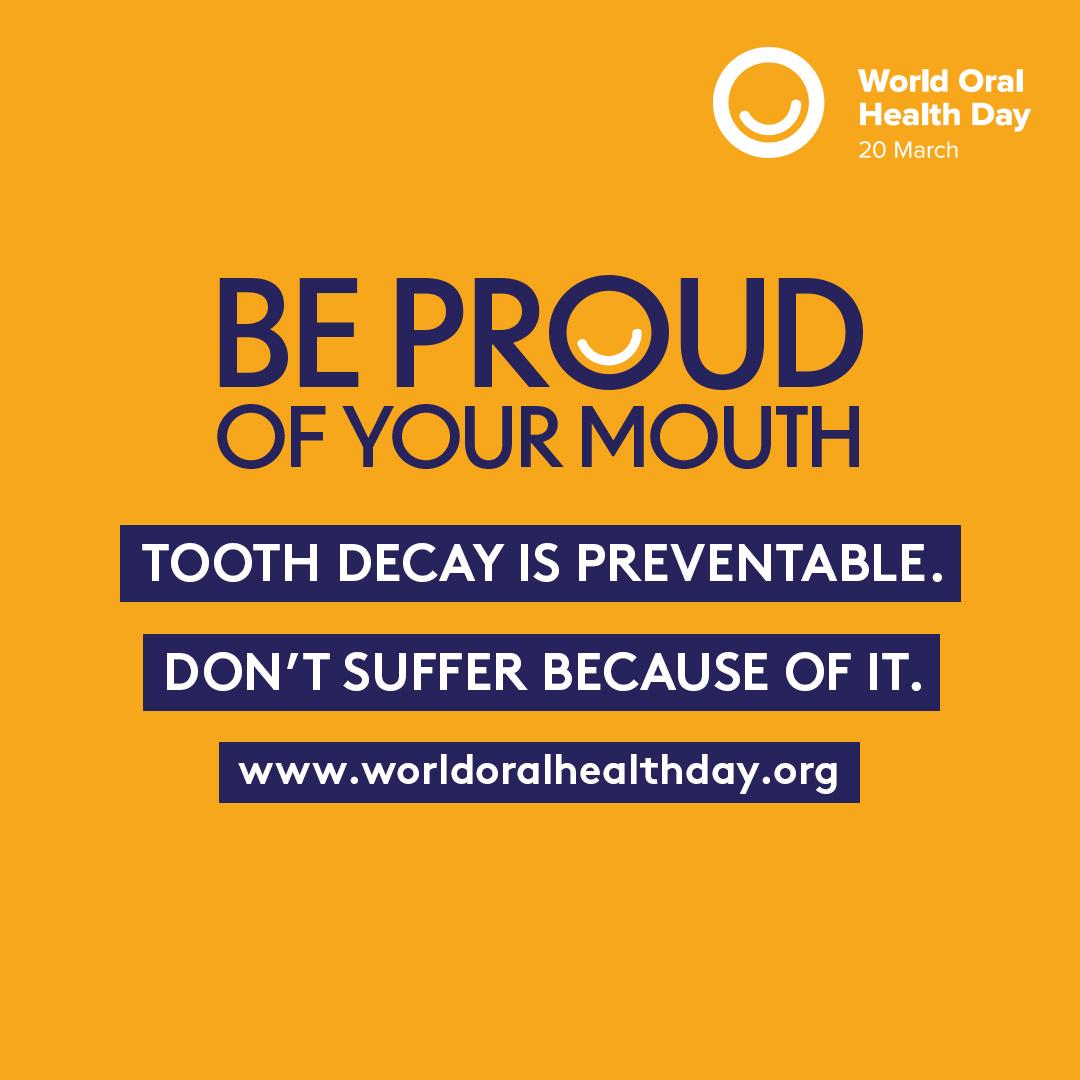On March 20th, 2013, the World Dental Federation officially established the first annual “World Oral Health Day” with the hopes of raising worldwide awareness to the significance of oral health. The mission of this campaign is not only to generate global awareness effort to highlight the importance of oral health, but also to help provide people across the world with the tools, information, and resources necessary to maintain proper oral hygiene habits. Since its inception, World Oral Health Day (or WOHD) has come to be recognized by dentists and patients in over 70 different countries and continues to remain one of the most essential health causes of its time.
Although an international campaign, World Oral Health Day is generally broken down into a community-based effort in which dentists and medical practitioners alike, work alongside schools, churches, and other local groups, in asking community members to compose a personal action plan to practice proper oral hygiene techniques and encourage others to follow suit. While indeed everyone can appreciate a beautiful smile, the aesthetic aspect is only a portion of the affect oral health can have on one’s life. As you will read in the following sections, oral health has a great influence on both an individual’s health and overall quality of their life, ultimately highlighting message of World Oral Health Day so it may ring loud and clear: “Your Teeth ARE Important!”
The Core of The Issue
As perhaps one of the most often overlooked aspects of a person’s health, it’s currently estimated that almost 90% of the world’s population will develop some type of oral disease in their lifetime! With such astronomical numbers, we need to ask ourselves: why do people allow their oral health to deteriorate? As you probably know, oral diseases are predominantly progressive illnesses which develop slowly over an extended period of time. Because of this, many experts within the World Oral Health Day campaign surmise that this is due to a lack of basic hygiene techniques established during one’s childhood. While a lapse in a few of the oral hygiene fundamentals might seem like just a minor oversight, if left uncorrected or unnoticed a small problem can eventually become a big problem as the person ages.
What’s the Worst That Can Happen?
So, you’re probably wondering what exactly can happen if inadequate hygiene habits are left undetected? Unfortunately, the answer is that a lot of things can happen and none of which are good. As mentioned previously, oral health issues gradually progress over time and become significantly worse in their later stages.
- Foul Breath: The condition known as halitosis or bad breath can certainly be the cause of social anxiety or embarrassment, however if this remains a persistent problem, there might be an additional oral issue to blame. Chronic foul breath is often indicative of numerous additional issues such as cavities, dry mouth, gum disease, or excess bacteria buildup.
- Gingivitis: The condition known as gingivitis, is the preliminary or minor form of gum disease. Although gingivitis is relatively common, if you have developed gingivitis, its important to take this seriously as the condition will continue to progress if not promptly treated.
- Tooth decay: As one of the most widespread diseases in the United States (second only to the common cold) tooth decay is the condition in which excessive buildup of bacteria in the mouth breaks down the tooth’s enamel, thus causing the tooth to decay. Tooth decay can affect people of all ages, and although slow to progress, if left untreated tooth decay can cause permanent damage to your teeth and gums.
- Periodontal disease: Also known as advanced gum disease, periodontal disease is a significant infection of the gum tissue and can cause a major health crisis if allowed to progress. If periodontal disease is allowed to worsen, it is likely to interact with and exacerbate other illnesses such as diabetes, or heart disease.
- Oral cancer: Oral cancer is an extremely aggressive type of cancer that is responsible for approximately 9,750 annual deaths in the U.S. alone, and remains a major health issue nationwide. While treatable in its early stages, if allowed to spread oral cancer may not be able to be stopped, thereby having potentially fatal consequences.
Related Articles:
- Mask Mouth and Oral Health: In the Shadow of Covid-19
- Vaping Causes Gum Disease and Damages Your Oral Health
Tips, Tools, and Techniques
- Frequent Brushing: As a general rule, you should always brush your teeth AT LEAST twice a day! However, if you have consumed any chewy or sticky foods, it is also a good idea to brush between meals as such materials tend to become stuck or lodged between any gaps or crevasses in your teeth.
- Proper Brushing Technique: Practicing correct brushing technique is one of the most important aspect of oral hygiene as failure to do so almost as bad as not bothering to brush at all! Proper brushing technique involves taking approximately two minutes to brush each upper and lower sections of your teeth gently, but thoroughly in approximately thirty second intervals. While It can be tricky to make this a habit, we assure you the results are worth it!
- Consider using mouthwash and fluoride toothpaste: Although perhaps more of a suggestion than an actual rule, utilizing products such a mouthwash and fluoride toothpaste allow you to better cleanse your mouth of harmful acidic agents that cause tooth decay, thus providing additional protection for your teeth.
- Always Floss: If you don’t already, please make flossing as mandatory as brushing! Remember, your teeth have numerous small and difficult to reach areas that your toothbrush simply can’t be expected to clean. Therefore, flossing is your primary means of reducing plaque buildup in theses areas and preventing your gums from becoming infected.
- Practice Moderation: Obviously sugary and acidic products can be hazardous to your oral health, and while we are not asking you to avoid these products completely, we do encourage you to enjoy such products in moderation.
- Follow the six-month rule: By adhering to the six-month rule, you should have at least two dental appointments each year. While it is very important to practice daily oral hygiene habits, it is also essential to visit your dentist’s office regularly, in order to catch and prevent any oral health concerns from becoming a serious health issue.
Related Article: Oral Health and Hygiene: Keep Your Immune System Strong
Be Proud of Your Mouth!
As we celebrate oral health day today (and every day), now is the ideal time to examine the daily oral hygiene habits of you and your family. Although oral health issues continue to affect a large number of people across the globe, the key to overcoming this crisis is for each individual person to take the necessary steps in protecting their smile! If you have any concerns regarding you or your family’s oral health, please contact our offices at Overland Park Dentistry.
Until next time keep on smiling!
Local dentist, Dr. Charles R. Kimes, DDS, and his team at Overland Park Dentistry look forward to having the opportunity to care for you and your family with preventative, restorative or cosmetic dentistry. To schedule your dental appointment with your Overland Park Dentist, contact us at our south Overland Park office at (913) 647-8700 or our north Overland Park office at (913) 341-2380.


